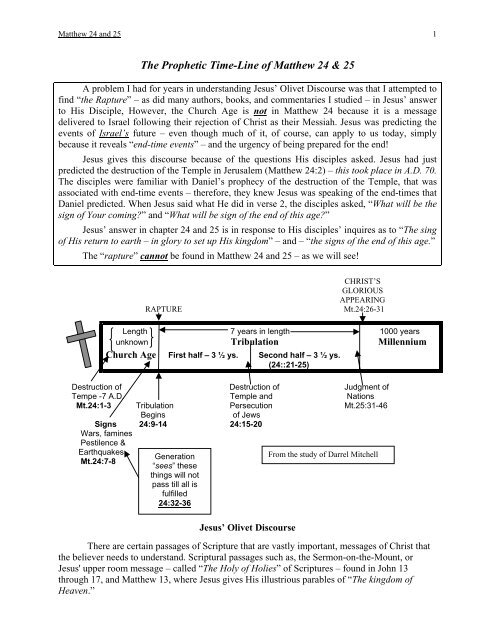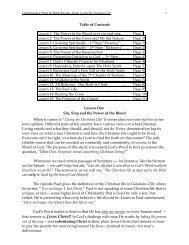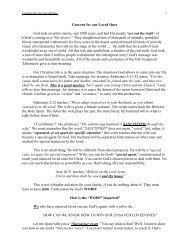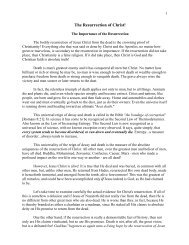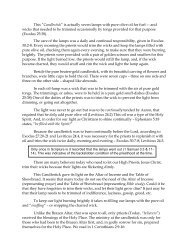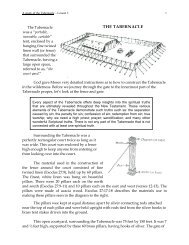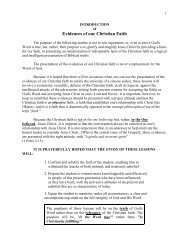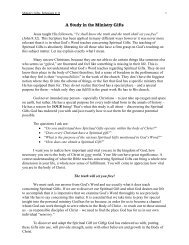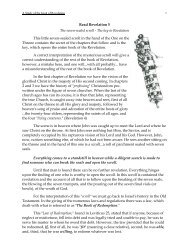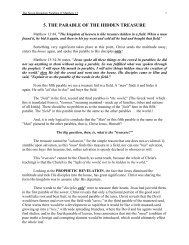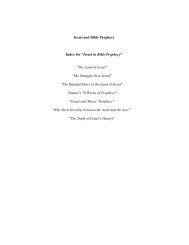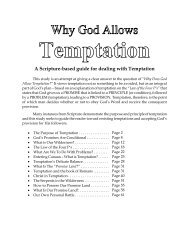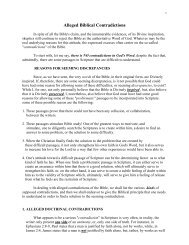The Prophetic Time-Line of Matthew 24 & 25 - NetBibleStudy.com
The Prophetic Time-Line of Matthew 24 & 25 - NetBibleStudy.com
The Prophetic Time-Line of Matthew 24 & 25 - NetBibleStudy.com
Create successful ePaper yourself
Turn your PDF publications into a flip-book with our unique Google optimized e-Paper software.
<strong>Matthew</strong> <strong>24</strong> and <strong>25</strong> 1<strong>The</strong> <strong>Prophetic</strong> <strong>Time</strong>-<strong>Line</strong> <strong>of</strong> <strong>Matthew</strong> <strong>24</strong> & <strong>25</strong>A problem I had for years in understanding Jesus’ Olivet Discourse was that I attempted t<strong>of</strong>ind “the Rapture” – as did many authors, books, and <strong>com</strong>mentaries I studied – in Jesus’ answerto His Disciple, However, the Church Age is not in <strong>Matthew</strong> <strong>24</strong> because it is a messagedelivered to Israel following their rejection <strong>of</strong> Christ as their Messiah. Jesus was predicting theevents <strong>of</strong> Israel’s future – even though much <strong>of</strong> it, <strong>of</strong> course, can apply to us today, simplybecause it reveals “end-time events” – and the urgency <strong>of</strong> being prepared for the end!Jesus gives this discourse because <strong>of</strong> the questions His disciples asked. Jesus had justpredicted the destruction <strong>of</strong> the Temple in Jerusalem (<strong>Matthew</strong> <strong>24</strong>:2) – this took place in A.D. 70.<strong>The</strong> disciples were familiar with Daniel’s prophecy <strong>of</strong> the destruction <strong>of</strong> the Temple, that wasassociated with end-time events – therefore, they knew Jesus was speaking <strong>of</strong> the end-times thatDaniel predicted. When Jesus said what He did in verse 2, the disciples asked, “What will be thesign <strong>of</strong> Your <strong>com</strong>ing?” and “What will be sign <strong>of</strong> the end <strong>of</strong> this age?”Jesus’ answer in chapter <strong>24</strong> and <strong>25</strong> is in response to His disciples’ inquires as to “<strong>The</strong> sing<strong>of</strong> His return to earth – in glory to set up His kingdom” – and – “the signs <strong>of</strong> the end <strong>of</strong> this age.”<strong>The</strong> “rapture” cannot be found in <strong>Matthew</strong> <strong>24</strong> and <strong>25</strong> – as we will see!RAPTURECHRIST’SGLORIOUSAPPEARINGMt.<strong>24</strong>:26-31Length 7 years in length 1000 yearsunknown Tribulation MillenniumChurch Age First half – 3 ½ ys. Second half – 3 ½ ys.(<strong>24</strong>::21-<strong>25</strong>)Destruction <strong>of</strong> Destruction <strong>of</strong> Judgment <strong>of</strong>Tempe -7 A.D. Temple and NationsMt.<strong>24</strong>:1-3 Tribulation Persecution Mt.<strong>25</strong>:31-46Begins<strong>of</strong> JewsSigns <strong>24</strong>:9-14 <strong>24</strong>:15-20Wars, faminesPestilence &EarthquakesMt.<strong>24</strong>:7-8Generation“sees” thesethings will notpass till all isfulfilled<strong>24</strong>:32-36Jesus’ Olivet DiscourseFrom the study <strong>of</strong> Darrel Mitchell<strong>The</strong>re are certain passages <strong>of</strong> Scripture that are vastly important, messages <strong>of</strong> Christ thatthe believer needs to understand. Scriptural passages such as, the Sermon-on-the-Mount, orJesus' upper room message – called “<strong>The</strong> Holy <strong>of</strong> Holies” <strong>of</strong> Scriptures – found in John 13through 17, and <strong>Matthew</strong> 13, where Jesus gives His illustrious parables <strong>of</strong> “<strong>The</strong> kingdom <strong>of</strong>Heaven.”
<strong>Matthew</strong> <strong>24</strong> and <strong>25</strong> 2In the <strong>24</strong> th and <strong>25</strong> th chapters <strong>of</strong> <strong>Matthew</strong> Jesus gives His “Olivet Discourse,” answeringurgent questions asked by His disciples concerning His return to earth and the end <strong>of</strong> this age.<strong>Matthew</strong> <strong>24</strong> ExplainedJesus’ Olivet Prophecy[Also in Mark 13 and Luke 21](I) Destruction <strong>of</strong> Jerusalem predictedVerse 1 And Jesus went out, and departed from the temple: and his disciples came to him for toshew him the buildings <strong>of</strong> the temple.Notice the setting, Jesus was leaving the Temple, walking away when His disciples cameup to Him to call His attention to the beautiful Temple buildings. Why? Why would they drawHis attention to the Temple? <strong>The</strong>y had been in and out <strong>of</strong> it many, many times! <strong>The</strong> reason wasbecause <strong>of</strong> what Jesus had just said. Let’s take note <strong>of</strong> what Jesus says in <strong>Matthew</strong> 23:37-39, “O,Jerusalem, Jerusalem, you who kill the prophets and stone those sent to you, how <strong>of</strong>ten I havelonged to gather your children together, as a hen gathers her chicks under her wings, but youwere not willing. Look, your house is left to you desolate. For I tell you, you will not see meagain until you, say, ‘Blessed is he who <strong>com</strong>es in the name <strong>of</strong> the Lord.’”Jesus' disciples were saying, in essence, “<strong>The</strong>re is nothing that indicates desolationhere.” See the beauty <strong>of</strong> the Temple, its strength and sturdiness. <strong>The</strong> appearance <strong>of</strong> the Templeseemed to contradict what Jesus had just said.<strong>The</strong> prophecy Jesus gives in <strong>Matthew</strong> <strong>24</strong> and <strong>25</strong> was uttered outside the Temple on theMount <strong>of</strong> Olives (Mt. <strong>24</strong>:3), while Luke 21was spoken in the temple before Jesus went out (Lk.21:1, 27-28). Herod's Temple was about 500 cubits square, made <strong>of</strong> white marble was one <strong>of</strong> thewonders <strong>of</strong> the ancient times.Verse 2 And Jesus said unto them, See ye not all these things? verily I say unto you, <strong>The</strong>re shallnot be left here one stone upon another, that shall not be thrown down.Jesus gives a definite, positive prophecy then He and His disciples walk silently out <strong>of</strong>the city <strong>of</strong> Jerusalem and pass on to the Mount Olive.This prophecy was fulfilled a generation later in 70 A.D. when Jerusalem was destroyedby the Romans; Dan. 9:26; Lk. 21:20-<strong>24</strong>). Josephus says that some stones were 94 feet long, 101/2 feet high, and 13 feet wide. <strong>The</strong>re were 162 columns which held up the porches that were 52feet high. Every stone was removed and a plow run over the place where it stood, fulfilling Mic.3:12.(II) Three great questions[Also Mk 13:3 & Lk.21:7]Verse 3 And as he sat upon the mount <strong>of</strong> Olives, the disciples came unto him privately, saying,Tell us, when shall these things be? and what shall be the sign <strong>of</strong> thy <strong>com</strong>ing, and <strong>of</strong> the end <strong>of</strong>the world?<strong>The</strong> most <strong>com</strong>manding view <strong>of</strong> the temple was obtained from the mount <strong>of</strong> Olives. HereJesus speaks “privately” – In Luke 21 Jesus speaks “publicly.”<strong>The</strong> disciples ask:1. “Tell us when these things will be?”2. “What shall be the sign <strong>of</strong> Your <strong>com</strong>ing?”3. “What will be the signs <strong>of</strong> the end <strong>of</strong> the age?”
<strong>Matthew</strong> <strong>24</strong> and <strong>25</strong> 3First, the disciples were asking about the destruction <strong>of</strong> the Temple, however, they thenasked about the “presence” <strong>of</strong> Jesus, Himself.We must not take this text out <strong>of</strong> its setting, or interpret these questions just to make themfit our belief about prophecy. It is true that Jesus' answer leads to a much larger area <strong>of</strong> prophecythen their questions, however it is important to remember that Jesus' answer began with thesequestions. It was these three questions <strong>of</strong> Jesus’ disciple that prompted and initiated Jesus’response in this Olivet Discourse.You will note that Jesus spoke <strong>of</strong> wars, plagues, famines, natural disasters, religiousapostasy and intense persecution <strong>of</strong> the people <strong>of</strong> God, - these are miserable conditions that willexist on the Earth just prior to the return <strong>of</strong> Jesus Christ according to the Bible.This is not a pleasant scenario, but it is the truth. I didn't make this up! <strong>The</strong>se are thewords <strong>of</strong> Jesus Himself. He said in verse 8 that these things would be the “beginning <strong>of</strong>sorrows,” or literally the “birth pangs,” the world would experience in the Last Days.As we study , keep in mind that, <strong>Matthew</strong> <strong>24</strong> begins with Jesus talking to His disciples.He had just told the multitude <strong>of</strong> people in <strong>Matthew</strong> 23 <strong>of</strong> the woes and judgments that were to<strong>com</strong>e upon Jerusalem and He had berated the Jewish religious leaders for their self-righteoushypocrisy. In fact, He called them “hypocrites” seven times in that passage. He also said theywere blind fools, children <strong>of</strong> hell, and snakes who could not escape damnation – these werepretty strong words.Jesus prophesied that the Temple itself, the center <strong>of</strong> Jewish religious life, would bedestroyed so <strong>com</strong>pletely that not one stone would be left on top <strong>of</strong> another (<strong>Matthew</strong> <strong>24</strong>:2).Jesus' disciples were amazed at His radical predictions, and they wanted to know threethings: when would all these destruction occur, and what would be the sign <strong>of</strong> the end <strong>of</strong> theworld, when Jesus would return?Three questions asked:1. When will Jerusalem be destroyed? Answered in verses 1-3 and Luke 21:12-<strong>24</strong>.2. What will be the sign <strong>of</strong> Your <strong>com</strong>ing? Answered in verses 4-26, 37-39.3. What will happen when You <strong>com</strong>e? Answered in verses <strong>24</strong>:27-31, 40-51; Mt. <strong>25</strong>:1-46.1. Deceptions (Mt. <strong>24</strong>:4-5, 11, <strong>24</strong>)2. False Christs (Mt. <strong>24</strong>:5, 23-26)3. Wars and rumors <strong>of</strong> wars (Mt. <strong>24</strong>:6-7)4. Famines (Mt. <strong>24</strong>:7; Rev. 6:5-6)5. Pestilences (Mt. <strong>24</strong>:7; Rev. 6:8)6. Earthquakes (Mt. <strong>24</strong>:7; Rev. 6:12-17)7. Anti-semitism (Mt. <strong>24</strong>:9; Mk. 13:9, 13)8. Offenses (Mt. <strong>24</strong>:10; cp. Mt. 18:1-10)9. Betrayals (Mt. <strong>24</strong>:9; Mk. 13:12)10. Hatred (Mt. <strong>24</strong>:10; 2Tim. 3:1-9)11. False prophets (Mt. <strong>24</strong>:11, <strong>24</strong>; Rev. 13)12. Lawlessness abounding (Mt. <strong>24</strong>:12)13. Love decreasing (Mt. <strong>24</strong>:12-13; 2Tim. 3)14. Increased missionary work (Mt. <strong>24</strong>:14)15. Abomination <strong>of</strong> desolation(Mt. <strong>24</strong>:15; Dan. 9:27; 2Th. 2:4; Rev. 13)Twenty-four signs <strong>of</strong> the second <strong>com</strong>ing:16. New Jewish nation in Judea(Mt. <strong>24</strong>:9, 15-26; Ezek. 37; Dan. 9:27)17. New Jewish temple(Mt. <strong>24</strong>:15, 26; Rev. 11:1-2; Dan. 8:9-13;Dan. 9:27; Dan. 11:45; 2Th. 2:4)18. Great tribulation <strong>of</strong> 3 1/2 years(Mt. <strong>24</strong>:21; Dan. 12:1; Rev. 12:1 -- Rev. 19:21)19. Martyrdoms (Mt. <strong>24</strong>:9, 22; Dan. 8:<strong>24</strong>; Rev. 7:9-17;Rev. 11:7; Rev. 15:2-4; Rev. 20:4-6)20. Flight <strong>of</strong> Jews from Judea(Mt. <strong>24</strong>:16-21; Rev. 12:6, 14; Isa. 16:1-5; Ps. 60:4-8;Dan. 11:40-45; Ezek. 20:33-38; Hos. 2:14-16)21. Increased satanic powers (Mt. <strong>24</strong>:<strong>24</strong>; 2Th. 2:8-12;Rev. 13; Rev. 16:14; Rev. 19:20)22. Surfeiting (Mt. <strong>24</strong>:38; Lk. 17:28; Lk. 21:34)23. Sex crimes (Mt. <strong>24</strong>:38; Lk. 17:27)
<strong>Matthew</strong> <strong>24</strong> and <strong>25</strong> 4<strong>24</strong>. Procrastination and lethargy (Mt. <strong>24</strong>:39)(III) Signs <strong>of</strong> the Second Coming <strong>of</strong> Christ(A) 8 signs beginning Jewish sorrows[Also Mk 13:8; Lk.21:8 and Rev – chapters 6-9]Verses 4 And Jesus answered and said unto them, Take heed that no man deceive you. 5 Formany shall <strong>com</strong>e in my name, saying, I am Christ; and shall deceive many. 6 And ye shall hear <strong>of</strong>wars and rumours <strong>of</strong> wars: see that ye be not troubled: for all these things must <strong>com</strong>e to pass,but the end is not yet. 7 For nation shall rise against nation, and kingdom against kingdom: andthere shall be famines, and pestilences, and earthquakes, in divers places.<strong>The</strong> disciples did not understand the concept <strong>of</strong> Jesus’ “Advent” – His return to earth.Like the prophets <strong>of</strong> the Old Testament, they did not see this present Church Age in God’sprediction for the future. This concept was revealed to them later [Read Ephesians 2:13-14 and3:1-6]. <strong>The</strong>y realized that Jesus would pass from their midst and somehow escape from thehostility <strong>of</strong> the Roman rulers, however, they did not understand the concept <strong>of</strong> His leaving earthand returning again sometime in the future. <strong>The</strong>y were asking, “Since this Temple is to bedestroyed, when will it be? Since You are <strong>com</strong>ing in judgment, how, and when, will it takeplace?”Without an understand <strong>of</strong> this present Church Age, the disciples asked about theprophecy Jesus gave concerning the destruction <strong>of</strong> the Temple – and <strong>of</strong> the end <strong>of</strong> “the age.”<strong>The</strong>y asked, “When will these things be? When will You return? When will be the consummation<strong>of</strong> this present age?”Jesus spends the next verses answering these specific questions the disciples had askedabout, and, even though the signs Jesus predicts concerns His <strong>com</strong>ing in revelation <strong>of</strong> power andgreat glory – what Jesus said is still pertinent to us today.Wars and Rumors <strong>of</strong> Wars<strong>The</strong>se verses (4 through 7) are a real eye-opener, Jesus said, “Many will make use <strong>of</strong> Myname, but don’t be deceived by them and don't be troubled, the end is not yet!” Note that Jesusreveals the answer to their question about the destruction <strong>of</strong> Jerusalem, but, He tells them, “theend is not yet.”Mt. <strong>24</strong>:4-26 are unfulfilled – Mt. <strong>24</strong>:27-51; Mt. <strong>25</strong>:1-46 will be fulfilled at the second<strong>com</strong>ing and in eternity. <strong>The</strong>re are many warnings against being deceived(Mt. <strong>24</strong>:4-5, 11, <strong>24</strong>; Lk. 21:8; 1Cor. 6:9; 1Cor. 15:33; Gal. 6:7; Eph. 5:6; 2Th. 2:3).Jesus gives general information about what things would be like in the Last Days beforethe end <strong>of</strong> the world - or literally, in the Greek, at the “end <strong>of</strong> the age.” That phrase, “the end <strong>of</strong>the age,” has the connotation <strong>of</strong> the end <strong>of</strong> a distinct period <strong>of</strong> time, rather than the ultimate end<strong>of</strong> everything that exists. So what Jesus is talking about here is the end <strong>of</strong> the current “age,” orthe period <strong>of</strong> human history in which we now live, that will “end,” with the Tribulation period.Verse 8 All these are the beginning <strong>of</strong> sorrows<strong>The</strong> first eight signs <strong>of</strong> Mt. <strong>24</strong>:4-7 are the beginning, not the end <strong>of</strong> sorrows. <strong>The</strong> wordtranslated, “sorrows” is from the Greek, “odin,” meaning, birth pangs (Gal. 4:19, 27; 1Th. 5:3;Rev. 12:2). This refers to the troubles <strong>of</strong> Israel in the tribulation (Mt. <strong>24</strong>:15-21; Isa. 66:7-8; Jer.30:4-7; Dan. 7:21; Dan. 8:9-14, <strong>24</strong>; Dan. 9:27; Rev. 12).
<strong>Matthew</strong> <strong>24</strong> and <strong>25</strong> 5<strong>The</strong>re are eight sings Jesus mentions that will talk place at the beginning <strong>of</strong> “Jewishsorrow.” <strong>The</strong>re are:1. “Many will make use <strong>of</strong> My name” – verse 52. “<strong>The</strong>y will deceive many” – verse 53. “<strong>The</strong>re will be rumors <strong>of</strong> war” – verse 64. “Nation will go to war with nation” – verse 75. “Kingdom will fight against kingdom” – verse76. “<strong>The</strong>re will be famines” – verse 77. “<strong>The</strong>re will be pestilences – verse 78. “<strong>The</strong>re will be earthquakes indifferent parts <strong>of</strong> the world” – verse 7(B) 8 signs during the sorrows <strong>of</strong> Israel[Also Mk 13:9]Verses 9 <strong>The</strong>n shall they deliver you up to be afflicted, and shall kill you: and ye shall be hated<strong>of</strong> all nations for my name's sake. 10 And then shall many be <strong>of</strong>fended, and shall betray oneanother, and shall hate one another. 11 And many false prophets shall rise, and shall deceivemany. 12 And because iniquity shall abound, the love <strong>of</strong> many shall wax cold.<strong>The</strong>n -- during birth pangs <strong>of</strong> Israel – Jews will be hated by the Gentiles.Verse 13 But he that shall endure unto the end, the same shall be saved.<strong>The</strong> word translated, “end,” from the Greek word “telos” means, “the actual end <strong>of</strong>anything” (Mt. <strong>24</strong>:6, 14). <strong>The</strong> Greek word, “sunteleia,” meaning, “the joining <strong>of</strong> two ages” is notthe Greek word that is used here in Mt.<strong>24</strong>:13 – as it is in Mt. 13:39, 40, 49; Mt. <strong>24</strong>:3; Mt. 28:20and Heb. 9:26. Here “telos” means the end <strong>of</strong> life or the age as it may be.<strong>The</strong> Greek word that is translated, “saved” is, “sozo” – It is used 110 times in the NewTestament” – to be saved from <strong>of</strong> sin (Mt. 1:21; Heb. 7:<strong>25</strong>), danger (Mt. 14:30; Mt. 27:42),spiritual conflict (Jn. 12:27; 1Tim. 4:16), sickness (Jas. 5:15), hell (Jn. 3:16-18; Mk. 16:16), andslavery (Jude 1:5).Verse 14 And this gospel <strong>of</strong> the kingdom shall be preached in all the world for a witness unto allnations; and then shall the end <strong>com</strong>e.Note that Jesus refers to “the Gospel <strong>of</strong> the kingdom” – not the message <strong>of</strong> Church –“salvation.” <strong>The</strong>n - the “end” – not the rapture – but the end <strong>of</strong> this age – will <strong>com</strong>e!In verses 9-14 Jesus gives signs that will take place during the time <strong>of</strong> “Israel’s sorrow,”the Tribulation period. Jesus states, “THEN” these things will happen . . . ”1. “<strong>The</strong>y will be delivered to be afflicted” – verse 92. “<strong>The</strong>y will be killed” – verse 93. “<strong>The</strong>y will be hated <strong>of</strong> all nations for Christ’s sake” – verse 94. “Many will be <strong>of</strong>fended” – [stumble, fall away – lose heart] – verse 105. “Many will betray one another” – verse 106. “Many will hate one another” – verse 107. “<strong>The</strong>re will be many false prophets” – verse 118. “Iniquity will abound” – verse 12“He who endures to the end will be saved” – verse 13
<strong>Matthew</strong> <strong>24</strong> and <strong>25</strong> 6“<strong>The</strong> Gospel <strong>of</strong> the kingdom [Note: Not the Gospel <strong>of</strong> salvation, but the Gospel <strong>of</strong> thekingdom] preached to all the world for a witness unto all nations; and then shall the end [not theRapture – but the end <strong>of</strong> this age] <strong>com</strong>e” – verse 14(C) 17 th sign: Abomination <strong>of</strong> Desolation – [Daniel 9:27][Also Mk13:14]Verse 15 When ye therefore shall see the abomination <strong>of</strong> desolation, spoken <strong>of</strong> by Daniel theprophet, stand in the holy place, (whoso readeth, let him understand:)“When” – marks the starting point <strong>of</strong> the middle <strong>of</strong> Daniel's 70th week when theAntichrist will break his 7-year covenant with Israel and enter Judea to take over Jerusalem ashis capital and the Jewish temple as his capital building (Dan. 9:27; Dan. 11:40-45; Dan. 12:1, 7;2Th. 2:4; Rev. 11:1-2; Rev. 12:1-17; Rev. 13:1-18). All this prophecy from Mt. <strong>24</strong>:15 on mustbe fulfilled the last 3 1/2 years <strong>of</strong> this age.“Abomination <strong>of</strong> desolation” refers to the Antichrist and his image in the Jewish temple atJerusalem during the last 3 1/2 years <strong>of</strong> this age (Dan. 8:9-14; Dan. 9:27; Dan. 11:45; Dan. 12:1,7, 11; Rev. 13:1-18; Rev. 14:9-11; Rev. 20:4-6).Verse 15 speaks <strong>of</strong> the “abomination <strong>of</strong> desolation spoken <strong>of</strong> by Daniel the prophet.” <strong>The</strong>“abomination <strong>of</strong> desolation” refers to the Antichrist and his image in the Jewish temple atJerusalem during the last 3 1/2 years <strong>of</strong> this age (Daniel 8:9-14; 9:27; 11:45; 12:1, 7, 11;Revelation 13:1-18; 14:9-11; 20:4-6).Jesus predicts the defeat <strong>of</strong> Israel during this period <strong>of</strong> time in verses 16-20(D) 18 th sign: defeat <strong>of</strong> Israel by Antichrist[Also Mk 13:15]Verse 16 <strong>The</strong>n let them which be in Judaea flee into the mountains:<strong>The</strong>n - when Antichrist enters Judea and takes over the temple (Dan. 9:27; Dan. 11:40-45). Israel will have to flee from Judea.<strong>The</strong> mountains refer to Edom and Moab which escape the Antichrist (Rev. 12:6, 14).“<strong>The</strong>n let them which be in Judea flee into the mountains” - when Antichrist enters Judeaand takes over the Temple (Daniel 9:27 and 11:40-45). Israel will have to flee from Judea. <strong>The</strong>“mountains” referred to is Edom and Moab, where Israel goes to escape the Antichrist,Revelation 12:6, 14.Verses 17 Let him which is on the housetop not <strong>com</strong>e down to take any thing out <strong>of</strong> his house:18 Neither let him which is in the field return back to take his clothes.Referring to Israel fleeing from Judea without taking time for valuables, lest Antichrist’sarmies overtake them.Verse 19 And woe unto them that are with child, and to them that give suck in those days!It will be hard on women with children or those great with child to flee before theswiftness <strong>of</strong> the invaders.Verse 20 But pray ye that your flight be not in the winter, neither on the Sabbath day:
<strong>Matthew</strong> <strong>24</strong> and <strong>25</strong> 7Pray that the invasion will not take place in winter as it would be difficult to flee withoutpreparation at this time; nor on the Sabbath, because orthodox Jews hold it unlawful to travelmore than a mile on that day (Acts 1:12), so would be overtaken by the invaders.(E) 19 th sign: Great Tribulation[Also Mk 13:19; Dan.12:1 and Rev, chapters 12-19]Verse 21 For then shall be great tribulation, such as was not since the beginning <strong>of</strong> the world tothis time, no, nor ever shall be.“For then” - the great tribulation <strong>of</strong> the last 3 1/2 years <strong>of</strong> this age will begin (Dan. 9:27;Dan. 11:40-45; Dan. 12:1, 7, 11; Jer. 30:4-7; Rev. 7:14; Rev. 11:1 -- Rev. 19:21).Verse 22 And except those days should be shortened, there should no flesh be saved: but for theelect's sake those days shall be shortened.<strong>The</strong> Greek word that is translated, “shortened” means, “curtailed.” <strong>The</strong> persecution itselfwill be cut short (Rev. 11:1-3; Rev. 12:6, 14; Rev. 13:5; Dan. 12:7).<strong>The</strong> “elect's sake” refers to Jews, not the Church because:1. Jesus is answering a Jewish question (Mt. <strong>24</strong>:3; Mt. <strong>25</strong>:31-46; Acts 1:6)2. False Messiahs primarily concern Israel (Mt. <strong>24</strong>:5, 23-26)3. Anti-semitism proves it (Mt. <strong>24</strong>:9)4. <strong>The</strong> travail <strong>of</strong> Israel (note, Mt. <strong>24</strong>:8)5. <strong>The</strong> abomination <strong>of</strong> desolation concerns Israel only (note, Mt. <strong>24</strong>:15)6. <strong>The</strong> Jewish temple (note, Mt. <strong>24</strong>:15)7. Flight <strong>of</strong> Israel (notes, Mt. <strong>24</strong>:16)8. <strong>The</strong> Sabbath is Jewish (note, Mt. <strong>24</strong>:20)9. <strong>The</strong> great tribulation (note, Mt. <strong>24</strong>:21)10. Jews are the only people to be gathered (note, Mt. <strong>24</strong>:31)11. <strong>The</strong> <strong>com</strong>ing <strong>of</strong> Christ is to deliver Israel (Mt. <strong>24</strong>:29-31; Mt. <strong>25</strong>:31-46; Zech. 14)12. Judgment <strong>of</strong> the nations is based on treatment <strong>of</strong> Israel (<strong>25</strong>:31-46)13. <strong>The</strong> eagles eating carcasses was predicted to be at the time <strong>of</strong> Israel's deliverance(Mt. <strong>24</strong>:28; Ezek. 39:17-22; Lk. 17:34-37; Rev. 19:17-21)14. <strong>The</strong> church will be raptured before the above events(F) 6 signs during the Great Tribulation[Also Mk 13:21]Verse 23 <strong>The</strong>n if any man shall say unto you, Lo, here is Christ, or there; believe it not.“<strong>The</strong>n” – during the great tribulation days <strong>of</strong> Mt. <strong>24</strong>:15-21.Verse <strong>24</strong> For there shall arise false Christs, and false prophets, and shall shew great signs andwonders; insomuch that, if it were possible, they shall deceive the very elect.Satanic powers will be manifest in the Tribulation (2Th. 2:7-12; Rev. 13:1-18; Rev.16:13-16; Rev. 19:20; Dan. 8:<strong>24</strong>). <strong>The</strong> “elect” – Jewish elect (See note for verse 22).Verses <strong>25</strong> Behold, I have told you before. 26 Wherefore if they shall say unto you, Behold, he isin the desert; go not forth: behold, he is in the secret chambers; believe it not.
<strong>Matthew</strong> <strong>24</strong> and <strong>25</strong> 8“Secret chambers” - Read Daniel 11:45; 2 <strong>The</strong>ssalonians 2:4 and Revelation, chapter 13.In verses 23 through 26 Jesus gives the signs that will take place during the GreatTribulation, the last 3 and ½ years.1. “Men will say, ‘Lo here is Christ’” – verse 232. “False christs will arise” – verse <strong>24</strong>3. “False prophets will arise” – verse <strong>24</strong>4. “<strong>The</strong>re will be signs and wonders preformed to deceive many” – verse <strong>24</strong>5. “Some will say ‘Christ is in the desert, or some secret place’” – verse 26Jesus tells <strong>of</strong> the manner <strong>of</strong> His <strong>com</strong>ing, when He returns with His saints “in power andgreat glory,” at the end <strong>of</strong> the Tribulation period.(4) <strong>The</strong> Manner and <strong>Time</strong> <strong>of</strong> the Second Coming Advent[Also Mt. <strong>25</strong>:31; Mk.13:<strong>24</strong>; Lk.17:33 and 21:<strong>25</strong>; 2 Th 1:7 and 2:8;Jude 14; Rev.1:7; 19:11; Dan. 7:13; Zech.14:1-5]Verse 27 For as the lightning <strong>com</strong>eth out <strong>of</strong> the east, and shineth even unto the west; so shallalso the <strong>com</strong>ing <strong>of</strong> the Son <strong>of</strong> man be.Refers to the time <strong>of</strong> Christ’s revelation and the manner in which He will <strong>com</strong>e.Verse 28 For wheresoever the carcase is, there will the eagles be gathered together.Where the dead bodies are slain at Armageddon the birds will be gathered together to eatthem (Job 39:30; Ezek. 39:17-22; Lk. 17:34-37; Rev. 19:17-21). <strong>The</strong> rapture will have takenplace years before this. Christ is not a dead carcass (as some teach) nor are the saints eagles to becaught up to such a carcass. This is not in the air, but on earth (Ezek. 39:17; Rev. 19:11-21).Verse 29 Immediately after the tribulation <strong>of</strong> those days shall the sun be darkened, and the moonshall not give her light, and the stars shall fall from heaven, and the powers <strong>of</strong> theheavens shall be shaken:“Immediately after the tribulation” – these things will take place! “Those days” refer tothe Great tribulation – the last half <strong>of</strong> the Tribulation period “Sun darkened, moon not givelight, stars fall from heaven, and powers <strong>of</strong> heavens shaken” - See Revelation 6:12.Verse 30 And then shall appear the sign <strong>of</strong> the Son <strong>of</strong> man in heaven: and then shall all thetribes <strong>of</strong> the earth mourn, and they shall see the Son <strong>of</strong> man <strong>com</strong>ing in the clouds <strong>of</strong>heaven with power and great glory.“And then” – immediately after the tribulation the Son <strong>of</strong> man will return in power andgreat glory (Mt. <strong>24</strong>:29-31; Mt. <strong>25</strong>:31-46). All the tribes <strong>of</strong> the earth mourn, including the armies<strong>of</strong> all nations surrounding the city (Zech. 14:1-5; Rev. 1:7). Many will not see Christ until He ishere reigning and the saints take over all parts <strong>of</strong> the earth – <strong>The</strong>n people will go up to Christ(Isa. 2:2-4; Isa. 52:7; Isa. 66:19-21; Zech. 8:23). <strong>The</strong>y will see the Son <strong>of</strong> man <strong>com</strong>ing with thenatural eyes. This is not a spiritual <strong>com</strong>ing (2Th. 1:7-10; Rev. 19:11-21; Zech. 14:1-5). Christwent away in clouds and He will return with clouds (Acts 1:9-11; Dan. 7:13-14; Rev. 14:14, 16).He will <strong>com</strong>e in power sufficient to defeat the armies <strong>of</strong> earth and Satan, all his fallen angels and
<strong>Matthew</strong> <strong>24</strong> and <strong>25</strong> 9demons in one day (Zech. 14; Rev. 19:11-21; Rev. 20:1-3; Jude 1:14; 2Th. 1:7-10; Isa. <strong>24</strong>:21-23;Joel 2). He will <strong>com</strong>e in great glory – Mt. <strong>25</strong>:31; 2Th. 1:7-10; 2Th. 2:8.Verse 31 And he shall send his angels with a great sound <strong>of</strong> a trumpet, and they shall gathertogether his elect from the four winds, from one end <strong>of</strong> heaven to the other.Literal angels ac<strong>com</strong>pany Christ to earth (2Th. 1:7-10) to gather Israel (Dt. 30:4; Isa.11:11-12) and separate the tares from the wheat (Mt. 13:38-50).Trumpets always sounded at gatherings <strong>of</strong> Israel (Ex. 19:13-19; Lev. <strong>25</strong>:9; 1Sam. 13:3;2Sam. 2:28). This trumpet is predicted in Isa. 18:3; Isa. 27:13; Zech. 9:14. This is not the sameas the seven trumpets <strong>of</strong> Rev. 8:2, 6 or the trumpets in connection with the resurrection <strong>of</strong> therighteous (1Th. 4:16; 1Cor. 15:51-58).<strong>The</strong> “Elect” are Jewish (See notes for Mt. <strong>24</strong>:22).20:8).<strong>The</strong> “four winds” refers to the four directions <strong>of</strong> the earth (Isa. 11:11-12; Rev. 7:1-3; Rev.(5) Parable <strong>of</strong> the fig-tree[Also Mk 13:38 and Lk 21:39]Verse 32 Now learn a parable <strong>of</strong> the fig tree; When his branch is yet tender, and putteth forthleaves, ye know that summer is nigh:“<strong>The</strong> parable <strong>of</strong> the fig tree” is the first <strong>of</strong> four parables in Mt. <strong>24</strong>-<strong>25</strong>, illustrating thenearness <strong>of</strong> Christ’s return (Mt. <strong>24</strong>:32-33).<strong>The</strong> fig tree is universally interpreted to mean the Jewish nation, however, Jesus must <strong>of</strong>meant more than that for Luke adds, “and all the trees” (Luke 21:29). – “Putting forth its leaves”indicates that summer is near, “so likewise” the signs <strong>of</strong> verses 4-26 indicate the nearness <strong>of</strong>Christ's <strong>com</strong>ing. So observe and understand the signs <strong>of</strong> the times, and <strong>com</strong>pare them with thepredictions <strong>of</strong> the word, as from thence to foresee what is at the door, that you may provideaccordingly. <strong>The</strong> fig tree, “when its tender shoots appear and are breaking into leaf” [As theNew English Bible translates verse 32] – its budding and blossoming signifies summer is inclose proximity.~~~~~~~~~~~~~~~~~~~~~~~~~~~~~~~~~~~~~~~~~~~~~~~~~~~~~~~~~~~~~~~~~~~~~~~~~~Don't pass over this verse too lightly! Notice first, Jesus warns His disciples lest they beled astray (verses 4-5). He speaks <strong>of</strong> future things dealing with matters <strong>of</strong> utmost importance,things <strong>of</strong> great peril. He tells them, “Don't wonder from the clear declaration <strong>of</strong> Scripture andarrive at some fanciful interpretation.”Jesus began by saying, “Take heed” – in modern vernacular would be, “Watch out!”Jesus prophesies, “What is the future for Israel?” in verses 5-35. He gives warnings forHis followers in <strong>Matthew</strong> <strong>24</strong>:36 to <strong>25</strong>:30, as we will see. He also shows what the future for theGentile nations will be – in <strong>Matthew</strong> <strong>25</strong>:31-46.Verse 33 So likewise ye, when ye shall see all these things, know that it is near, even at thedoors.Jesus refers to His second <strong>com</strong>ing – not the rapture! <strong>The</strong>re are no signs <strong>of</strong> the rapture forit is itself one <strong>of</strong> the greatest signs <strong>of</strong> the second <strong>com</strong>ing. <strong>The</strong>re are no prophecies to be fulfilledbefore the rapture for it could have taken place any time in the past or can take place any time in
<strong>Matthew</strong> <strong>24</strong> and <strong>25</strong> 10the future without any sign or prophecy <strong>com</strong>ing to pass (Tit. 2:13; Phil. 3:20-21). All signs <strong>of</strong>the <strong>com</strong>ing <strong>of</strong> Christ point to the second <strong>com</strong>ing – (Christ’s revelation in power and great glory)– and not the rapture. <strong>The</strong>re will be at least seven years between the two events. <strong>The</strong> rapture isnot the second <strong>com</strong>ing, because Christ does not <strong>com</strong>e to the earth at that time. He meets thesaints in the air and takes them back to heaven (1Th. 2:19; 1Th. 3:13; Rev. 19:1-11). <strong>The</strong> saintsstay in heaven with Him for these years and then return to the earth at the second <strong>com</strong>ing (Zech.14:5; Jude 1:14; Rev. 19:11-21).(6) All signs <strong>of</strong> this prophecy will take place in one generation[Also Mk 13:30 and Lk 21:32-33]Verse 34 Verily I say unto you, This generation shall not pass, till all these things be fulfilled.<strong>The</strong> statement, “this generation,” occurs 16 times in the New Testament and always <strong>of</strong> aparticular span <strong>of</strong> life – and not <strong>of</strong> a race <strong>of</strong> people, as some teach (See Mt. 11:16; Mt. 12:41-42;Mt. 23:36; Mt. <strong>24</strong>:34; Mk. 8:12; Mk. 13:30; Lk. 7:31; Lk. 11:30-32, 50-51; Lk. 17:<strong>25</strong> & 21:32).This verse refers to the last generation living on earth at the time all these things will befulfilled. <strong>The</strong>se things will be fulfilled in one generation only and not in several <strong>of</strong> them.Verse 35 Heaven and earth shall pass away, but my words shall not pass away.<strong>The</strong> words, “pass away,” are translated from the Greek word, “parerchomai,” meaning,“to change from one condition or state to another; pass away, as a person passes away in death,or as old things pass away at the new birth” (2Cor. 5:17). It never means annihilation, but achange only. <strong>The</strong> heavens and earth are eternal (Ps. 72:5-17; Ps. 89:3-37; Ps. 104:5; Eccl. 1:4)and cannot pass out <strong>of</strong> existence. <strong>The</strong>y will be changed (Heb. 1:10-12; Heb. 12:<strong>25</strong>-28; Rom.8:21-23), be renovated by fire (2Pet. 3:5-13), and be renewed (Rev. 21:1), but never pass out <strong>of</strong>existence. Jesus said, “Heaven and earth will be changed, but My words will not be changed.”<strong>The</strong> generation that witnesses the fulfillment <strong>of</strong> these signs “will not pass away, until allthese things will be fulfilled!”When will this happen?(7) Exact date <strong>of</strong> Christ’s <strong>com</strong>ing unknown[Also Mk13:34 and Acts 1:7]Verse 36 But <strong>of</strong> that day and hour knoweth no man, no, not the angels <strong>of</strong> heaven, but my Fatheronly.Jesus taught that as a woman knows she must travail if she is with child but knows notthe day or the hour, so it is with the sudden destruction. We may know the times and seasons <strong>of</strong>it, but not the day or the hour. Since the second <strong>com</strong>ing <strong>of</strong> Christ brings this sudden destructionit means that men will not know the exact day or the hour <strong>of</strong> His <strong>com</strong>ing. This will always bethe case, as predicted by Christ in Mt. <strong>24</strong>:36, 39, 42-51; Mt. <strong>25</strong>:13. Jesus Christ and angels donot know the day or hour <strong>of</strong> the second <strong>com</strong>ing (Mk. 13:32).<strong>The</strong>refore, it is folly for any one to make predictions and set dates for the return <strong>of</strong> JesusChrist to earth, for the end <strong>of</strong> the times <strong>of</strong> the Gentiles, for the battle <strong>of</strong> Armageddon, or for thesudden destruction <strong>of</strong> 1Th. 5:3.
<strong>Matthew</strong> <strong>24</strong> and <strong>25</strong> 11(8) Christ’s <strong>com</strong>ing will bring destruction to many wicked[Also Lk 17:22; 1Th 5;1 and Jude 14]What Will Christ’s Coming Be Like?Verses 37 But as the days <strong>of</strong> Noe were, so shall also the <strong>com</strong>ing <strong>of</strong> the Son <strong>of</strong> man be. 38 For asin the days that were before the flood they were eating and drinking, marrying and giving inmarriage, until the day that Noe entered into the ark, 39 And knew not until the flood came, andtook them all away; so shall also the <strong>com</strong>ing <strong>of</strong> the Son <strong>of</strong> man be.Just as sin continued up to the very day Noah entered the ark, so sin will continue up tothe day <strong>of</strong> the second <strong>com</strong>ing <strong>of</strong> Christ. Hence, there is no room for a Millennium <strong>of</strong>righteousness before Christ's <strong>com</strong>ing. In fact, Christ must <strong>com</strong>e before the Millennium begins(Rev. 19:11 -- Rev. 20:10) and sin will continue in the Millennium (Isa. 65:20-<strong>25</strong>; Rev. 20:7-10;Eph. 1:10). <strong>The</strong> purpose <strong>of</strong> the Millennium is to put down all sin and rebellion (1Cor. 15:<strong>24</strong>-28).<strong>The</strong> phrase, “took them all away,” is rendered “destroyed them all” in Luke 17:27, that is,the ones that needed to be destroyed, and saved Noah and family. So Christ will destroy some atHis <strong>com</strong>ing and leave some to replenish the earth in the Millennium (Zech. 14:16-21; Isa. 2:2-4;Isa. 66:19-21; Rev. 20).(9) Armageddon: some destroyed and some left alive[Also Lk 17:26; 21:34; Rev, chapters 19-21; Zech 14:16]Verses 40 <strong>The</strong>n shall two be in the field; the one shall be taken, and the other left. 41 Twowomen shall be grinding at the mill; the one shall be taken, and the other left.“<strong>The</strong>n,” refers to Christ’s Second Coming, not at the rapture, as many believe. (Mt.<strong>24</strong>:29-31; Mt. <strong>25</strong>:31-46). “Taken” like the flood “took them all away” or destroyed them (Mt.<strong>24</strong>:39; Lk. 17:27). Did the flood rapture or destroy the people that it took away? So the second<strong>com</strong>ing, when Christ’s <strong>com</strong>e in power and great glory at the Revelation, will not rapture butdestroy many at the battle <strong>of</strong> Armageddon to make the carcasses that will be eaten by the fowls<strong>of</strong> Mt. <strong>24</strong>:28; Lk. 17:34-37; Ezek. 39:17-22; Rev. 19:17-21. (See notes for verse 28).Some will be “left,” not destroyed, like Noah and his family were left and not destroyed.At Armageddon many will be left to continue living on earth when Christ reigns (Zech. 14:16-21; Mt. <strong>25</strong>:34, 46; Isa. 2:2-4; Isa. 66:19-21; Rev. 20:4-10).Verse 42 Watch therefore: for ye know not what hour your Lord doth <strong>com</strong>e.In view <strong>of</strong> the <strong>com</strong>ing <strong>of</strong> Christ suddenly when He is not expected, you that will be livingon earth after the rapture and at the very <strong>com</strong>ing <strong>of</strong> Christ, be watchful (Mt. <strong>24</strong>:39-42). Thisrefers to the literal visible <strong>com</strong>ing to the earth with the raptured saints.(10) Parable <strong>of</strong> the faithful servant[Also Lk 12:35-38]Verses 43 But know this, that if the goodman <strong>of</strong> the house had known in what watch the thiefwould <strong>com</strong>e, he would have watched, and would not have suffered his house to be broken up.44 <strong>The</strong>refore be ye also ready: for in such an hour as ye think not the Son <strong>of</strong> man <strong>com</strong>eth.
<strong>Matthew</strong> <strong>24</strong> and <strong>25</strong> 1<strong>24</strong>5 Who then is a faithful and wise servant, whom his lord hath made ruler over his household, togive them meat in due season? 46 Blessed is that servant, whom his lord when he <strong>com</strong>eth shallfind so doing.This is the second parable <strong>of</strong> <strong>Matthew</strong> <strong>24</strong> and <strong>25</strong>, illustrating readiness, and faithfulness,in view <strong>of</strong> Christ’s <strong>com</strong>ing.<strong>The</strong> word, “blessed,” or “happy,” is used <strong>of</strong> people who have godly characteristics as:1. Broken spirit (Mt. 5:3; Mt. 11:28-30; Ps. 51:17; Isa. 57:15; Isa. 66:2)2. Penitent spirit (Mt. 5:4; Isa. 61:2; Jas. 4:9; 2Cor. 7:9-11)3. Mild-tempered, gentle spirit (Mt. 5:5; Mt. 11:29; Ps. 37:11; 1Pet. 3:4)4. Hungering, thirsting spirit for righteousness(Mt. 5:6; Ps. 34:10; Ps. 42:1-3; Ps. 63:1; Ps. 84:2; Jn. 7:37-39)5. Compassionate and merciful spirit (Mt. 5:7; Mt. 18:27; 1Pet. 3:8)6. Pure spirit (Mt. 5:8; Phil. 4:8; 1Tim. 1:5; 1Tim. 3:9; 1Tim. 5:22; 1Pet. 1:22)7. Spirit <strong>of</strong> wisdom and mediation (Mt. 5:9; Rom. 14:19; 1Cor. 13)8. Longsuffering and forgiving spirit(Mt. 5:10-12; Mt. 10:16-28; 1Cor. 13; 1Pet. 3:14-17; 1Pet. 4:3-19)Verses 47 Verily I say unto you, That he shall make him ruler over all his goods. 48 But and ifthat evil servant shall say in his heart, My lord delayeth his <strong>com</strong>ing; 49 And shall begin to smitehis fellowservants, and to eat and drink with the drunken; 50 <strong>The</strong> lord <strong>of</strong> that servant shall <strong>com</strong>ein a day when he looketh not for him, and in an hour that he is not aware <strong>of</strong>, 51 And shall cuthim asunder, and appoint him his portion with the hypocrites: there shall be weeping andgnashing <strong>of</strong> teeth.Here is another description <strong>of</strong> eternal hell, not the grave (Mt. 13:42, 50; Rev. 9:2).Adjective used to describe the eternal retribution are: “wailing,” in Mt. 13:42 & 50; “weepingand gnashing <strong>of</strong> teeth” in Mt. 8:12; Mt. 22:13; Mt. <strong>24</strong>:51; Mt. <strong>25</strong>:30; Lk. 13:28 – all thesepassages <strong>of</strong> Scripture picture bitter remorse and pain.<strong>Matthew</strong> <strong>25</strong> Explained(11) <strong>The</strong> parable <strong>of</strong> the ten virginsVerses 1 <strong>The</strong>n shall the kingdom <strong>of</strong> heaven be likened unto ten virgins, which took their lamps,and went forth to meet the bridegroom. 2 And five <strong>of</strong> them were wise, and five were foolish.<strong>The</strong> “<strong>The</strong>n” <strong>of</strong> verse 1, refers to the second <strong>com</strong>ing at the end <strong>of</strong> the tribulation whenChrist <strong>com</strong>es with His saints (Mt. <strong>25</strong>:3, 27-31, 33, 36, 39-51), not at the rapture when He <strong>com</strong>esfor them. It is important to note the connecting adverbs <strong>of</strong> time from Mt. <strong>25</strong>:15 to 28 – “when”<strong>of</strong> Mt <strong>25</strong>:15 – “then” <strong>of</strong> Mt. <strong>25</strong>:16 – “then” <strong>of</strong> Mt. <strong>25</strong>:21 – and “then” <strong>of</strong> Mt. <strong>25</strong>:23. <strong>The</strong>se cover3 1/2 years from the setting up <strong>of</strong> the abomination <strong>of</strong> desolation in the middle <strong>of</strong> Daniel's 70thweek to the second <strong>com</strong>ing at the end <strong>of</strong> this week. <strong>The</strong>n in Mt. <strong>25</strong>:29 we have a new timeelement, the second <strong>com</strong>ing itself, immediately after the tribulation <strong>of</strong> Mt. <strong>25</strong>:15-28. Note theevents connected with this by the same kind <strong>of</strong> adverb <strong>of</strong> time: “then” <strong>of</strong> Mt. <strong>25</strong>:30, – “then” <strong>of</strong>Mt. <strong>25</strong>:40 – and – “then” <strong>of</strong> Mt. <strong>25</strong>:1.<strong>The</strong> “Kingdom <strong>of</strong> heaven,” is not referring to the church – likened to ten virgins. Thisliterally is, “kingdom from the heavens.” It is headed by Jesus Christ for the purpose <strong>of</strong> re-
<strong>Matthew</strong> <strong>24</strong> and <strong>25</strong> 13establishing the kingdom <strong>of</strong> God over this rebellious part <strong>of</strong> God's realm. Only found in<strong>Matthew</strong> because it is the gospel <strong>of</strong> Jehovah's King. It is a dispensational term and refers toMessiah's kingdom on earth. Offered by both John and Jesus (Mt. 3:2; Mt. 4:17; Mt. 10:7).Because it was rejected, it was postponed until Christ <strong>com</strong>es and set up the kingdom (Mt. 11:12,20-<strong>24</strong>; Mt. 27:22-<strong>25</strong>; Lk. 19:11-27; Acts 1:6-7; Acts 3:19-26). It is now the realm <strong>of</strong> pr<strong>of</strong>ession(Mt. 13:11-17, 30, 38-43, 47-50). <strong>The</strong> parables <strong>of</strong> the kingdom apply to this age. At the endChrist will <strong>com</strong>e and set up a literal earthly kingdom forever (Mt. <strong>25</strong>:31-46; Rev. 11:15; Rev.19:11 -- Rev. 20:10; Zech. 14; Isa. 9:6-7; Dan. 2:44-45; Dan. 7:13-27; Lk. 1:32-33). During thefirst 1,000 years <strong>of</strong> His eternal reign He will put down all rebellion and rid the earth <strong>of</strong> all rebels.<strong>The</strong>n God will be<strong>com</strong>e "all in all" as before rebellion (Rev. 20:1-10; Rev. 21:1 -- Rev. 22:5;1Cor. 15:<strong>24</strong>-28; Eph. 1:10). Anything said <strong>of</strong> the kingdom <strong>of</strong> heaven can also be said <strong>of</strong> thekingdom <strong>of</strong> God, because the former is only the earthly dispensational aspect <strong>of</strong> the latter.<strong>The</strong> “Kingdom <strong>of</strong> God” refers to the sovereignty <strong>of</strong> God. It is used 70 times and the“kingdom <strong>of</strong> heaven” 33 times<strong>The</strong> third parable <strong>of</strong> <strong>Matthew</strong> <strong>24</strong> and <strong>25</strong> illustrate watchfulness in view <strong>of</strong> Christ’s<strong>com</strong>ing. <strong>The</strong> ten virgins are ten young ladies who were friends <strong>of</strong> a certain girl that is married.Verse 3 <strong>The</strong>y that were foolish took their lamps, and took no oil with them:Five were foolish, because they did not take extra oil in separate vessels to replenish theirsupply in their lamps should the oil be used up.Verse 4 But the wise took oil in their vessels with their lamps.Five were wise, because they took extra oil in separate vessels besides what they had intheir lamps.Verse 5 While the bridegroom tarried, they all slumbered and slept.During the hours before midnight they all became sleepy and slept.Verse 6 And at midnight there was a cry made, Behold, the bridegroom <strong>com</strong>eth; go ye out tomeet him.What is mean by, “midnight?” Jewish weddings were generally celebrated at night,starting at the rise <strong>of</strong> the evening star; but in this case there was some extra delay and thebridegroom and his friends arrived at midnight.This was customary. Starting from the home <strong>of</strong> the bridegroom his friends began cryingthis and all along the route people would take up the joyous cry until it would get near enough tothe home <strong>of</strong> the bride that it would wake up the sleeping ones. It was the duty <strong>of</strong> the ones chosenby the bride to wel<strong>com</strong>e the bridegroom, therefore, the “cry go ye out to meet him.”Verse 7 <strong>The</strong>n all those virgins arose, and trimmed their lamps.“<strong>The</strong>n” – when they heard the cry. <strong>The</strong>y all arose to trim their lamps and get them inorder. <strong>The</strong>y all had lamps burning when they went to sleep, but the lamps <strong>of</strong> the foolish neededmore oil. <strong>The</strong> Greek reads, “our lamps are going out” (in verse 8). <strong>The</strong>y asked for oil from theextra that the wise had, but were sent to buy some quickly.Verses 8 And the foolish said unto the wise, Give us <strong>of</strong> your oil; for our lamps are gone out.
<strong>Matthew</strong> <strong>24</strong> and <strong>25</strong> 149 But the wise answered, saying, Not so; lest there be not enough for us and you: but go yerather to them that sell, and buy for yourselves.<strong>The</strong> “lamp oil,” is not referring to the Holy Spirit, as some think, because He cannot bebought and sold or divided between people at their request.Verses 10 And while they went to buy, the bridegroom came; and they that were ready went inwith him to the marriage: and the door was shut. 11 Afterward came also the other virgins,saying, Lord, Lord, open to us.<strong>The</strong> bridegroom that was married to a certain young lady, does not refer to Christ’s<strong>com</strong>ing for His saints. [<strong>The</strong> marriage <strong>of</strong> the couple in this story does not refer to the MarriageSupper <strong>of</strong> the Lamb <strong>of</strong> Rev 19:1-10.]<strong>The</strong> door was “shut.” Doors were always locked to uninvited guests and for fear <strong>of</strong>thieves who would rob the guests or carry <strong>of</strong>f the bride for a ransom.Verse 12 But he answered and said, Verily I say unto you, I know you not“I know you not,” was true, because they were friends <strong>of</strong> the bride, not necessarily thebridegroom who is called “Lord” in verse 11.Verse 13 Watch therefore, for ye know neither the day nor the hour wherein the Son <strong>of</strong> man<strong>com</strong>et and <strong>of</strong> the talentsThis is the point that Jesus illustrated by this story <strong>of</strong> an oriental wedding: He was saying,“You people on earth in the kingdom <strong>of</strong> heaven take a lesson from these virgins and be alwayswatchful in view <strong>of</strong> My <strong>com</strong>ing.” <strong>The</strong> details <strong>of</strong> this parable must not be interpreted here – anymore than if they were used in an illustration outside the Bible. <strong>The</strong>y were necessary in order tomake the story to illustrate watchfulness, but to teach various doctrines from them isunscriptural. No less than a dozen false doctrines are based upon the details <strong>of</strong> this parable.Twelve False Doctrines:1. Two kinds <strong>of</strong> Christians.2. <strong>The</strong> oil is the Spirit baptism.3. Wise are those with this baptism.4. Foolish are those without it.5. Born again people do not have the Holy Spirit.6. Rapture will take place at midnight or middle <strong>of</strong> the tribulation.7. One has to have the Spirit baptism to go in the rapture.8. Only those baptized in the Spirit will be at the marriage <strong>of</strong> the Lamb.9. Only those baptized in the Spirit will be in the bride <strong>of</strong> Christ.10. One is not saved until he receives the Spirit baptism.11. <strong>The</strong> door <strong>of</strong> mercy will be shut to the Gentiles after the rapture.12. <strong>The</strong> bride is the church.<strong>The</strong> Truth Is:1. <strong>The</strong>re is only one kind <strong>of</strong> Christian, the born-again (Mt. 13:38-49; Mt. 18:3; Jn. 3:3-5;2Cor. 5:17-18; Rom. 6:7, 18, 22; Rom. 8:1-13; Gal. 5:19-<strong>24</strong>; Eph. 4:<strong>24</strong>; 1Jn. 2:29; 1Jn. 3:8-10; 1Jn. 5:1-4, 18; Heb. 12:14).2. <strong>The</strong> oil here is not the Holy Spirit (note, Mt. <strong>25</strong>:8).
<strong>Matthew</strong> <strong>24</strong> and <strong>25</strong> 153. Born-again people do receive the Holy Spirit (Jn. 3:5; Rom. 8:9-16), but not always the Spiritbaptism which is another experience (Lk. 11:13; Jn. 7:37-39; Jn. 14:16-17; Acts 1:4-8;Acts 2:38-39; Acts 5:32; Acts 8:15-16; Acts 19:1-6).4. <strong>The</strong> rapture will not take place in the middle <strong>of</strong> the tribulation, but before it.5. <strong>The</strong> Spirit baptism is for the endowment <strong>of</strong> power from on high to do the works <strong>of</strong> Jesus(Lk. <strong>24</strong>:49; Jn. 7:37-39; Jn. 14:12; Acts 1:4-8), not to save the soul or to qualify one for therapture.6. All Christians will be at the marriage supper <strong>of</strong> the Lamb, for all will go in the rapture.7. All Christians will be in the bride <strong>of</strong> Christ, which is the New Jerusalem and not the church(Rev. 21:2, 9-10). Even Old Testament saints will be a part <strong>of</strong> the city (Heb. 11:10-16; cp.Heb. 13:14; Jn. 14:1-3).8. <strong>The</strong> door <strong>of</strong> mercy will never be closed to Jews or Gentiles during the tribulation or any othertime. Multitudes will be saved during the tribulation (Acts 2:16-21; Rev. 7:1-17; Rev. 12:17;Rev. 15:2-4; Rev. 20:4-6).(12) Parable <strong>of</strong> the talents[Also Lk 19:11 and Mt 16:27]Verse 14 For the kingdom <strong>of</strong> heaven is as a man travelling into a far country, who called hisown servants, and delivered unto them his goods.<strong>The</strong> fourth parable <strong>of</strong> <strong>Matthew</strong> <strong>24</strong> and <strong>25</strong> – illustrating diligence in view <strong>of</strong> Christ’s<strong>com</strong>ing (Mt. <strong>25</strong>:14-30).Verses 15 And unto one he gave five talents, to another two, and to another one; to every manaccording to his several ability; and straightway took his journey. 16 <strong>The</strong>n he that had receivedthe five talents went and traded with the same, and made them other five talents. 17 And likewisehe that had received two, he also gained other two. 18 But he that had received one went anddigged in the earth, and hid his lord's money.To understand the value Jesus put on these “talents,” it’s important to remember that at$600,000 each for talents <strong>of</strong> gold, 5 would be worth $3 million; two would be $1.2 million, and,even, one $600,000.Verse 19 After a long time the lord <strong>of</strong> those servants <strong>com</strong>eth, and reckoneth with them.<strong>The</strong> phrase, “reckoneth with them” has the meaning <strong>of</strong>, “<strong>com</strong>pared accounts.” Thatphrase is only here and in <strong>Matthew</strong> 18:23-<strong>24</strong>.Verse 20 And so he that had received five talents came and brought other five talents, saying,Lord, thou deliveredst unto me five talents: behold, I have gained beside them five talents more.<strong>The</strong> servant who had five talents gained another five talents, doubling his talents so hehad $6 million in the bank to give his lord.Verses 21 His lord said unto him, Well done, thou good and faithful servant: thou hast beenfaithful over a few things, I will make thee ruler over many things: enter thou into the joy <strong>of</strong> thylord. 22 He also that had received two talents came and said, Lord, thou deliveredst unto me two
<strong>Matthew</strong> <strong>24</strong> and <strong>25</strong> 16talents: behold, I have gained two other talents beside them. 23 His lord said unto him, Welldone, good and faithful servant; thou hast been faithful over a few things, I will make thee rulerover many things: enter thou into the joy <strong>of</strong> thy lord.<strong>The</strong> servant who had two talents doubled his talents so he had $2.4 million in the bank togive his lord.Verse <strong>24</strong> <strong>The</strong>n he which had received the one talent came and said, Lord, I knew thee that thouart an hard man, reaping where thou hast not sown, and gathering where thou hast not strawed:<strong>The</strong> master <strong>of</strong> these servants in this story is not Jesus Christ.Hardhearted man, thus accusing his master to excuse his own slothfulness.<strong>The</strong> Greek word translated as, “strawed,” has the meaning <strong>of</strong>, “scattered abroad,” as ifhis master reaped without sowing. <strong>The</strong> attitude <strong>of</strong> a slothful man who thinks everything others doprospers where it would fail in his case.Verse <strong>25</strong> And I was afraid, and went and hid thy talent in the earth: lo, there thou hast that isthine.Being “afraid” is another characteristic <strong>of</strong> a slothful man. He is always afraid to ventureout in business and take risks.Verse 26 His lord answered and said unto him, Thou wicked and slothful servant, thou knewestthat I reap where I sowed not, and gather where I have not strawed:His lord says, “If you thought I was that kind <strong>of</strong> man, then you ought to have been faithfulto your trust.”Verse 27 Thou oughtest therefore to have put my money to the exchangers, and then at my<strong>com</strong>ing I should have received mine own with usury.<strong>The</strong> “exchangers” were the bankers who would give interest; “usury,” meant there wouldat least be interest, even if there were no other pr<strong>of</strong>it.Verses 28 Take therefore the talent from him, and give it unto him which hath ten talents. 29 Forunto every one that hath shall be given, and he shall have abundance: but from him that hath notshall be taken away even that which he hath. 30 And cast ye the unpr<strong>of</strong>itable servant into outerdarkness: there shall be weeping and gnashing <strong>of</strong> teeth.He was a servant as much as the rest <strong>of</strong> them, but he became unpr<strong>of</strong>itable (vs.14 & 19).“Weeping and gnashing <strong>of</strong> teeth” – See notes for <strong>Matthew</strong> <strong>24</strong>:51 – page 9(13) Judgment <strong>of</strong> the living nations at Christ’s Second Advent[Also Rev 19:11 and Zech 14]<strong>The</strong> description <strong>of</strong> the last judgmentVerse 31 When the Son <strong>of</strong> man shall <strong>com</strong>e in his glory, and all the holy angels with him, thenshall he sit upon the throne <strong>of</strong> his glory:When will the Son <strong>of</strong> man <strong>com</strong>e in His glory? Answer – “immediately after thetribulation!” (See Mt. <strong>24</strong>:29-31; 2Th. 1:7-10; 2Th. 2:8 and Rev. 19:11-21).
<strong>Matthew</strong> <strong>24</strong> and <strong>25</strong> 17For, “angels with him,” see notes for <strong>Matthew</strong> <strong>24</strong>:31.“<strong>The</strong>n shall He sit upon the throne <strong>of</strong> His glory!” When? - at the second <strong>com</strong>ing (See Mt.<strong>24</strong>:29; <strong>25</strong>:34, 37, 41, 44, 45).Christ will be “sitting on the throne <strong>of</strong> His glory!” – Also see Mt. 19:28 and Jer. 14:21.Verses 32 And before him shall be gathered all nations: and he shall separate them one fromanother, as a shepherd divideth his sheep from the goats: 33 And he shall set the sheep on hisright hand, but the goats on the left. 34 <strong>The</strong>n shall the King say unto them on his right hand,Come, ye blessed <strong>of</strong> my Father, inherit the kingdom prepared for you from the foundation <strong>of</strong> theworld: 35 For I was an hungred, and ye gave me meat: I was thirsty, and ye gave me drink: Iwas a stranger, and ye took me in: 36 Naked, and ye clothed me: I was sick, and ye visited me: Iwas in prison, and ye came unto me.All nations will be gathered for judgment at the end <strong>of</strong> the Tribulation period to decidewhich ones will enter into Christ’s glorious rein on earth for one thousand years. When Christ<strong>com</strong>es to set up His kingdom there will be a judgment <strong>of</strong> all nations on how they treated Israel.This is not the judgment <strong>of</strong> the wicked dead!Contrasts between the Two Judgments:Judgment <strong>of</strong> the nations Judgment <strong>of</strong> the wicked<strong>Matthew</strong> <strong>25</strong>:31-46 Revelation 20:11-151. Living nations the wicked dead2. Before Millennium after Millennium3. Christ the Judge God the Judge4. On earth in heaven5. Two classes one class6. Some saved none saved7. Some destroyed all destroyed8. No resurrections a resurrection9. No books opened books opened10. Basis: persecution <strong>of</strong> Jews all sins <strong>of</strong> all men11. One generation many generations12. Gentiles only Jews and Gentiles13. Angels help none mentioned14. Some go to hell all go to hell15. Some enter kingdom none enter it16. Separation <strong>of</strong> good from bad no good at all17. To determine who continuesto live on earthnone here will liveon earth again18. Some enter eternal life none enter itSheep and goats were allowed to feed together by day but were separated at night, aseach owner gathered his own. (For this time <strong>of</strong> end-time separation – read <strong>Matthew</strong> 13:39-50).When Jesus says, “Inherit the kingdom prepared for you from the foundation <strong>of</strong> theworld,” He is stating that the purpose <strong>of</strong> this judgment is to determine who shall enter thekingdom (Dan. 7:9-14, 22; Rev. 11:15), and to give the meek the earth as promised (Ps. 37:11;Mt. 5:5).
<strong>Matthew</strong> <strong>24</strong> and <strong>25</strong> 18Verse 37 <strong>The</strong>n shall the righteous answer him, saying, Lord, when saw we thee an hungred, andfed thee? or thirsty, and gave thee drink? 38 When saw we thee a stranger, and took thee in? ornaked, and clothed thee? 39 Or when saw we thee sick, or in prison, and came unto thee?40 And the King shall answer and say unto them, Verily I say unto you, Inasmuch as ye havedone it unto one <strong>of</strong> the least <strong>of</strong> these my brethren, ye have done it unto me.<strong>The</strong> reason and basis <strong>of</strong> the judgment <strong>of</strong> the nations is God cursing or blessing nationsaccording to how men have dealt with Israel. God will forever respect and fulfill the Abrahamiccovenant (Gen. 12:1-3). When Jesus said, “My brethren,” He was referring to the Jewish people,the brethren <strong>of</strong> Jesus according to the flesh (Mt. 10:6; Jn. 1:11; Rom. 9:5).Verses 41 <strong>The</strong>n shall he say also unto them on the left hand, Depart from me, ye cursed, intoeverlasting fire, prepared for the devil and his angels: 42 For I was an hungred, and ye gave meno meat: I was thirsty, and ye gave me no drink: 43 I was a stranger, and ye took me not in:naked, and ye clothed me not: sick, and in prison, and ye visited me not. 44 <strong>The</strong>n shall they alsoanswer him, saying, Lord, when saw we thee an hungred, or athirst, or a stranger, or naked, orsick, or in prison, and did not minister unto thee? 45 <strong>The</strong>n shall he answer them, saying, Verily Isay unto you, Inasmuch as ye did it not to one <strong>of</strong> the least <strong>of</strong> these, ye did it not to me. 46 Andthese shall go away into everlasting punishment: but the righteous into life eternal.Some nations will be sent to the lake <strong>of</strong> fire and eternal punishment (Mt. <strong>25</strong>:41, 46; Mt.13:39-50; Mt. <strong>24</strong>:51; Rev. 14:9-11; Rev. 19:20; Rev. 20:10).Note, hell was prepared for Satan and his angels and no man needs to go there (Jn. 3:16-20). If he persists in serving Satan then he will have to spend eternity with him (Mt. <strong>25</strong>:41, 46).<strong>The</strong> Greek word, “aionios,” translated as “everlasting,” means eternal. It is translated“everlasting “and “eternal” <strong>of</strong> twenty things:1. God (Rom. 1:20; Rom. 16:26)2. <strong>The</strong> Holy Spirit (Heb. 9:14)3. Life (44 times, Mt. 19:16, 29; Mt. <strong>25</strong>:46; Jn. 3:16, 36; Rom. 6:22)4. Salvation (Heb. 5:9)5. Redemption (Heb. 9:12)6. Inheritance (Heb. 9:15)7. Gospel (Rev. 14:6)8. Covenant (Heb. 13:20)9. Kingdom (2Pet. 1:11)10. Honor and power (1Tim. 6:16)11. Consolation (2Th. 2:16)12. Glory (2Th. 1:10; 1Pet. 5:10)13. Resurrected bodies (2Cor. 5:1)14. Things not seen (2Cor. 4:18)15. Habitations (Lk. 16:9)16. Destruction (2Th. 1:9)17. Judgment (Heb. 6:1-2)18. Damnation (Mk. 3:29)19. Fire (Mt. 18:8; Mt. <strong>25</strong>:41; Jude 1:7)20. Punishment (Mt. <strong>25</strong>:46)
<strong>Matthew</strong> <strong>24</strong> and <strong>25</strong> 19<strong>The</strong> same Greek word is translated “everlasting” and “eternal” here in <strong>Matthew</strong> <strong>25</strong>:46and is used to describe both the eternal punishment <strong>of</strong> the wicked and the eternal life <strong>of</strong> therighteous; if one is eternal the other one is also everlasting.~~~~~~~~~~~~~~~~~~~~~~~~~~~~~~~~~~~~~~~~~~~~~~~~~~~~~~~~~~~~~~~~~~~~~~~~~~<strong>The</strong> Teachings <strong>of</strong> <strong>Prophetic</strong> Events are Interesting,however,<strong>The</strong>re are some lessons to be learned for followers <strong>of</strong> Jesus ChristToday!ResponsibilitiesNote, that beginning with verse 45, Jesus asks a serious question. Jesus <strong>com</strong>mences thissection with the question, “Who then is the faithful and wise servant?” and ends, speaking <strong>of</strong>our present responsibility, in the 30th verse <strong>of</strong> chapter <strong>25</strong>.<strong>Matthew</strong> <strong>24</strong>:45 through <strong>25</strong>:30 consist <strong>of</strong> parables, indicating the responsibilities restingupon those whom Christ was leaving in charge during a period in which He (as to bodilypresence) would be absent from them – I would like to share what I believe to be insight intowhat Jesus was teaching here.Keep in mind that in the midst <strong>of</strong> this Oliver Discourse, (<strong>Matthew</strong> <strong>25</strong>:45), Jesus asks thisessential and crucial question, “Who then is the faithful and wise servant, whom the master hasput in charge <strong>of</strong> the servants in his household to give them their food at the proper time?"Jesus had been speaking <strong>of</strong> prophetic events, answering His disciple’s questions, howeverHe changes, in <strong>Matthew</strong> <strong>24</strong>:45, from just speaking <strong>of</strong> the prediction <strong>of</strong> future events – to give arevelation <strong>of</strong> present responsibility. From the question in <strong>24</strong>:45, through chapter <strong>25</strong>:31, is notonly prophetic, but deals, as well, with responsibilities during this present age.After characterizing two kinds <strong>of</strong> servants, beginning with <strong>Matthew</strong> <strong>24</strong>:46 and runningthrough the rest <strong>of</strong> the Olivet discourse, He gives three parables:1. <strong>The</strong> Parable <strong>of</strong> the Household and the servants2. <strong>The</strong> Parable <strong>of</strong> the 10 Virgins3. <strong>The</strong> Parable <strong>of</strong> the TalentsJesus tells <strong>of</strong> His <strong>com</strong>ing in <strong>24</strong>:44, “So you also must be ready, because the Son <strong>of</strong> Manwill <strong>com</strong>e at an hour when you do not expect Him.” He speaks <strong>of</strong> days that are to <strong>com</strong>e when theSon <strong>of</strong> Man shall be manifested. However, now, in this day, He speaks <strong>of</strong> “servants.”<strong>Matthew</strong> <strong>24</strong>:46-51 gives a picture <strong>of</strong> rebellious souls, rejecting Him, saying, “He delaysHis <strong>com</strong>ing.” <strong>The</strong>y smite their fellowmen, and are drunken, but still He is patient. However,there is <strong>com</strong>ing a day when His eyes will flash and He will descend from heaven in fire andflame, flashing glory. He will cast out all evil and take vengeance.Jesus teaches that the purpose and mission <strong>of</strong> Christ in this day <strong>of</strong> God’s grace – in thisChurch Age – is to seek and to save the lost. Today, we are living in a probationary period, butsomeday that time will be over.
<strong>Matthew</strong> <strong>24</strong> and <strong>25</strong> 20If anyone thinks <strong>of</strong> the mission <strong>of</strong> Jesus as simply saving men in order to take them to alife beyond, they have misread what Jesus taught – and what He prayed for!Jesus turns from the negative survey to a more positive one beginning with <strong>Matthew</strong><strong>24</strong>:46, running through <strong>25</strong>:30. This passage consists <strong>of</strong> three parables, indicating theresponsibilities that rest upon the Church. Christ's bodily presence would be absent from theearth, but He would be present through His Mystical body, the Church.Read these parables again, to refresh your memory <strong>of</strong> them:1st Parable: <strong>Matthew</strong> <strong>24</strong>:42-512nd parable <strong>Matthew</strong> <strong>25</strong>:1-13,3rd Parable, <strong>Matthew</strong> <strong>25</strong>: 14-30,THE SIMILARITIES IN EACH PARABLE:(I) THE MASTER IS ABSENT1. <strong>The</strong> master <strong>of</strong> the household, <strong>com</strong>mits certain duties to his servantsand then, he is absent!2. <strong>The</strong> bridegroom is absent3. <strong>The</strong> master (owner <strong>of</strong> goods) gives talents to his servantsand then, he is absent(II) THE RELATIONSHIP OF THE ABSENT MASTER(with those from whom he is absent)1. <strong>The</strong> servants represent his authority2. <strong>The</strong> "waiting" <strong>of</strong> the virgins attest to their belief in his return3. <strong>The</strong> servants prosecuted the master's business, with his goods- the talents - which he gave to them - are all his goods- not their ability - not their capacity- the talents do not stand for quality, but for quantity in this parable!(III) THE RESPONSITILITY WAS ALWAYS TO THEIR MASTER ALONE1. <strong>The</strong> servant’s responsibility to the absent master2. <strong>The</strong> virgins responsible to be ready at any given moment3. <strong>The</strong> servants who received talents and their responsibility to the masterTHE DIFFERENCES BETWEEN THE PARABLES:1. Pictures <strong>of</strong> the master's household’s COMMUNAL responsibility2. Pictures the INDIVIDUAL soul’s relation to his master,showing the wise and the foolish3. Pictures the responsibility <strong>of</strong> carrying out master's enterprise in the world.Let’s look at these parables as a “whole,” rather than in detail.1. <strong>The</strong> parable <strong>of</strong> the Household gives the two examples, those who are faithfuland wise and those who are called, “<strong>The</strong> wicked.” This parable presents theChurch as a household, over which Christ is Master.2. <strong>The</strong> parable <strong>of</strong> the 10 Virgins shows our attitude toward Christ in the days <strong>of</strong>His absence.
<strong>Matthew</strong> <strong>24</strong> and <strong>25</strong> 213. <strong>The</strong> parable <strong>of</strong> the Talents show our responsibility <strong>of</strong> Christ's enterprisesFirst, let’s look at the parable <strong>of</strong> the Household. Here, the church is Christ's household.He is the Master Who has left us in charge <strong>of</strong> is household.<strong>The</strong> Greek word, translated “household,” is found only one other time in the Scripture.It’s in Revelation 22:2, where it states, “the leaves <strong>of</strong> the tree were for the healing <strong>of</strong> thenations.” Note, here, that this same Greek word is translated as “healing.”What relation can there be between “healing” and “household?” This question can onlyanswered by an understanding <strong>of</strong> what this word translated as, “household” really signifies. It isa word from which we derive our word “therapeutic.” <strong>The</strong> basic idea <strong>of</strong> this word is healing.This word “household” refers to those in the house that serve.Look at <strong>Matthew</strong> <strong>24</strong>:45 again, “Who then is the faithful and wise servant?” This wordtranslated as “servant” is the word, “bond-slave,” while the Greek word translated “household”also means “ servant,” it <strong>com</strong>e from an entirely different word – a Greek word meaning “onewho performs a loving service” – or, “one whose purpose is to bring about a healing in service.”This is a case <strong>of</strong> “metonymy,” – meaning, “the use <strong>of</strong> a word for that <strong>of</strong> another to whichit is related, to emphasize a concept.” For instance, we say, “A man keeps a good table,” whenwe are really referring to his food – or, we might use the word “scepter” when referring tosovereignty.This word, “household,” found in <strong>Matthew</strong> <strong>24</strong>:45, is a parable suggesting the picture <strong>of</strong> agreat house, with one Master. All those in the house are under His control. <strong>The</strong>ir interests areconstantly in His thoughts, while they are serving under His <strong>com</strong>mand.Jesus uses the word that indicates the love principle in service – the tender healingministry that only grows out <strong>of</strong> love. Thus, in a word, flaming and flashing with meaning, wediscover our Lord's conception <strong>of</strong> His Church during the time <strong>of</strong> His absence.His “household” serve, however, they serve by love – and their ministry is a healingministry.Note <strong>Matthew</strong> <strong>24</strong>:45 carefully, “Who then is the faithful and wise servant, whom his lordhath set over his household?” This word, “household,” must be interpreted by the consistentteaching <strong>of</strong> the Lord, that service is the condition <strong>of</strong> greatness!<strong>The</strong> servant is “set over” – made ruler over; put in charge – he is a servant. Jesus taught“Whosoever would be first among you, shall be servant <strong>of</strong> all” (Mark 9:35 and 10:44).This is not a picture <strong>of</strong> one in an <strong>of</strong>ficial authority, but rather, it is a picture <strong>of</strong> one in theexercise <strong>of</strong> the ministry <strong>of</strong> healing – and <strong>of</strong> love!SERVICE IS THE CONDITION FOR GREATNESSWe see the attitude <strong>of</strong> a faithful and wise servant. One who expresses an attitude <strong>of</strong>caring for all others while His Lord is away.
<strong>Matthew</strong> <strong>24</strong> and <strong>25</strong> 22<strong>The</strong> attitude <strong>of</strong> “the evil servant” who says, “My master is staying alway a long time”(delays his <strong>com</strong>ing) and he turns to an evil course, instead <strong>of</strong> feeding and caring for thehousehold. He “beats” them and, then, turns to <strong>com</strong>panions <strong>of</strong> drunkards.TWO RESULTS WHEN THE MASTER RETURNS:1. <strong>The</strong> servant who was loyal is promoted and put in a place <strong>of</strong> authority.2. <strong>The</strong> unfaithful servant is cut asunder and cast out.We must not carry these parables farther than God meant them to go. Jesus is teachingthat we prove our loyalty to our Lord by the way we serve one another. Disloyalty beats andslays the brethren.In the parable <strong>of</strong> the Virgins, we see two attitudes – the attitude <strong>of</strong> the wise and theattitude <strong>of</strong> the foolish. <strong>The</strong>y all “went forth,” however, some <strong>of</strong> them were careless. This parableis not a story <strong>of</strong> service, but rather, one <strong>of</strong> personal relationship.<strong>The</strong>re is no apparent difference between the ten virgins. <strong>The</strong>y all spoke <strong>of</strong> their desire tomeet the Bridegroom. Jesus, in this parable, is not speaking <strong>of</strong> particular section <strong>of</strong> Christendom,as some teach, but rather He is speaking <strong>of</strong> individual souls in relation to the Master.Nothing is said in this parable about the “responsibility in the household,” but rather, itspeaks <strong>of</strong> the “attitude <strong>of</strong> the individual toward the Master.” It speaks <strong>of</strong> those who have noeyes, no thought, no care, except for Bridegroom and the hour <strong>of</strong> His <strong>com</strong>ing.<strong>The</strong> Last Parable in Jesus’ Olivet discourse begins with, “For thekingdom <strong>of</strong> heaven is as a man traveling into a far country, whocalled his own servants, and delivered unto them his goods”(<strong>Matthew</strong> <strong>25</strong>:14).This parable speaks <strong>of</strong> the faithful use <strong>of</strong> talents brought the Master's “Well done thougood and faithful servant, thou hast been faithful over a few things, I will set thee over manythings.” One <strong>of</strong> servants was unfaithful – his life is exposed, his talents are recalled and he is“cast out.”Note, again, that in the parable <strong>of</strong> the master and his servants reveals the mutual ministrythat is to exist within the household, <strong>Matthew</strong> <strong>24</strong>:46-51. We are to care for, and feed, others, notill-treat, or beat, our fellow servants.<strong>The</strong> parable <strong>of</strong> the 10 virgins reveals what our personal life must be, <strong>Matthew</strong> <strong>25</strong>:1-13. Itis to be an attitude <strong>of</strong> loyalty <strong>of</strong> love to Jesus Christ. Our love will be tested in loyalty in small,seemingly insignificant, things.<strong>The</strong> parable <strong>of</strong> the talents reveals our responsible for Master's work, <strong>Matthew</strong> <strong>25</strong>:14-30.Jesus has <strong>com</strong>mittee to us His goods and, in His absence, we are to represent Him to this worldduring this Church age.1. <strong>The</strong> “household” at peace!2. Lamps burning - ready!3. <strong>The</strong> individual character is using his talents (working) for eternity!


